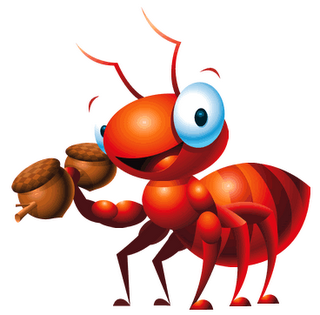I grew up singing the ABCs with Elmo on Sesame Street, solving puzzles with Steve on Blue's Clues, and following Dora the Explorer on her adventures. English was my first and only language. That is, until my first trip to China.
I was five years old when my mom took my sister and me to visit my grandparents. On the first morning, I scampered to my grandmother's bedroom in my favorite purple T-shirt with butterflies. She was intently watching the morning news, but when she saw me, she flipped the channel to a cartoon about a family of ants. I didn't understand anything the ants were saying but I was excited to point out to my grandmother what was on the TV.

I jumped up to the screen and pointed at the baby ant.
"Ant!" I exclaimed.
My grandmother looked over at me with a really confused look on her face.
"Ant! Ant!" I stubbornly repeated with frustration .
My sister chimed in with her gibberish, and my grandmother furrowed brow relaxed. (My sister probably came in when I was watching the ants eat their oatmeal.)
It never occurred to me that my grandmother couldn't understand what I was saying. After awhile, I became more attentive to the conversations around me. Of course I didn't understand anything since I didn't have Google Translate handy, but I absorbed the enunciation and inflection of the sounds. I was intrigued by this new language.
After this trip, my parents decided to teach me Chinese. I learned the basics of pronunciation, like the alphabet, four main tones, and pin yin (your best friend in learning Chinese). My vocabulary grew as I frequently conversed with my mom. As for the reading and writing, I learned that in Chinese school. Up until seventh grade, I took classes for four hours every Sunday with lengthy assignments of at least ten pages of homework. Although I never looked forward them, those classes taught me the communication skills and vocabulary necessary to live in China for a month.
- The most complex character--56 strokes.
Now, four years later, I've retained my ability to read some news articles, speak fluently, and understand it. I learned how to write some fancy characters, which by now I've probably forgotten up to 90% of them. The most important part to me is being able to speak it, which I am so accustomed to doing as soon as I enter my home. It comes to me naturally.
I mostly speak to my parents in Chinese--but more often Chinglish. A typical after-school conversation with my mom usually goes like this:
"Hi Mom! 你能来接我吗? 十五分钟. At Conestoga. Thanks. Bye."
When my friends learn that I can speak Chinese, they ask me to translate all sorts of odd words. One time, this boy whipped out Google Translate on his phone and started asking me to read the obscurest Chinese characters that he translated from English. He probably didn't even know if I was pronouncing them correctly or not.
Sadly, I'm guilty of this too. When somebody opens up and says, "I know how to speak Chinese," I get extremely excited.
I then follow up with, "Can you say something in Chinese?" and nine times out of ten I get tentative a "你好?" back. Once I received a "我是一个苹果", the most creative response.
It's these small things in addition to connecting to my heritage that makes me glad that I learned Chinese. English and Chinese are fundamentally different languages and they represent the different parts of me.



No comments:
Post a Comment